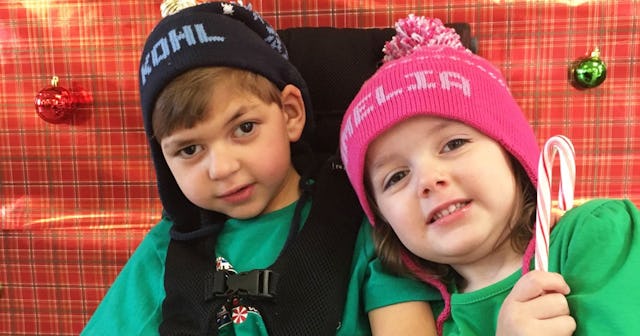Anxiety About The Future Can Tarnish Even The Most Beautiful Moments

Sometimes grief and anxiety arrive unexpectedly. Sometimes, they barge into life’s most beautiful scenes and disrupt its most precious moments. Those two pricks made yet another unannounced visit to me this week into one such beautiful scene, disrupting one such precious moment.
I had gone for a walk with my son, Kohl and my daughter Amelia. We were trying to give some space to my wife Sarah who was facing a tight deadline at work and needed a brief reprieve from the abundance of quality time we have all enjoyed lately. We all needed a reprieve. So we went off on a jaunt to the park across the street, an activity that has truly kept us sane during the quarantine.
It was characteristic of the silver-lined simple pleasures that many of us have rediscovered in recent weeks. We scavenger-hunted. We marveled at the ancient, hundred year old oaks draped in Spanish moss that we are so fortunate to see every day in South Louisiana. We have given many of those trees names, an activity so delightfully pure that I have often wondered why it has taken me so long to do such a thing, despite living right across the street from this beautiful park for over 10 years. We counted lizards and butterflies. We took a rest on the bench and let the breeze blow across our faces.
I was treated to the music of Amelia’s voice, a painfully shy five-year-old who rarely shares her words with strangers or even acquaintances, but vomits them out in abundance on walks such as these in the comfort of her immediate family. There were numerous hypothetical questions about the wind, logs, beetles and her recent obsession with ants, all posed using animated hand gestures.
I delighted in the melody of Kohl’s laugh as we raced from tree to tree, Kohl in his wheelchair, Amelia in her stylish suede boots, selected despite my warnings about choosing form over function. Because I don’t get to have a conversation with Kohl in words or ever get to hear him describe how his day was as an eight-year-old would, that laugh is one of my favorite sounds, that smile one of my favorite sights.
Courtesy of Andy Chrestman
Sometimes, during moments like these, anxiety and grief sneak up on me and gently tap me on the shoulder, interrupting my enjoyment of them.
“Better enjoy Amelia’s company now while you can,” they whisper before showing me unwanted scenes of teenage Amelia wanting nothing to do with me or adult Amelia moving on and living her own life as we drift into the background.
They go on with greater intensity.
“Enjoy Kohl’s smile and his little voice now while they last,” they say to me before tormenting me with brief, yet palpable scenes of Kohl as a severely disabled adult who is no longer cute or, even worse, gone altogether.
Then I ignore the central tenets of mindfulness as I admonish my brain for creating these thoughts, sometimes going so far as to actually tell myself to “stop it” out loud or gently slap my own head rather than allow those thoughts to simply dissipate and return to the present. Then, I wonder if I am going insane.
But then, there are times when these terrible twins show up in less subtle ways as they did this particular day when Kohl, Amelia and I were returning home from the park. As we headed back home, Amelia posed yet another set of hypothetical questions, this time about the future.
“Where would we all be? Would we still live in our yellow house?” she wondered.
I answered her questions about a scene she was imagining 15 years in our future.
“Well, I will be 55, your mom will be 51, Kohl will be 23, and you will be 20,” I explained. “You will probably be in college.”
While I answered her innocent questions, a quiet terror lurked beneath the surface, as I contemplated Kohl. My mind immediately went back to the Neonatal Intensive Care Unit where he spent a month after his birth. I hadn’t thought specifically about the meeting we had with the neurologist back then where we were informed that, statistically, children like our son with severe, global brain damage, don’t live past about 15 years. I’m sure his intent was not to permanently tattoo that concept into our brains and gift us a lifetime of mind-numbing anxiety, but that’s what he did. It is now why I all-too-frequently check on Kohl throughout the night and why almost every morning when I get him out of bed, a small part of me braces and prays that he is still breathing.
Then, I moved on from entertaining one of my life’s worst fears to contemplating one that is not far behind. If, God-willing, Kohl outlives those grim predictions, then what? What will life be like when we are firmly into our middle ages and have a 23-year-old son who at the age of eight is completely dependent on us for all aspects of his life? Then what?
“And Kohl will probably have a job,” Amelia suddenly replied, immediately taking me back to the present moment — pushing Kohl’s wheelchair through the park and holding her little hand.
They take one last jab as I lament the fact that such terrible thoughts can be juxtaposed with such beautiful moments, tarnishing them. Then as they finally release their hold, I harness the hope of a five-year-old.
This article was originally published on